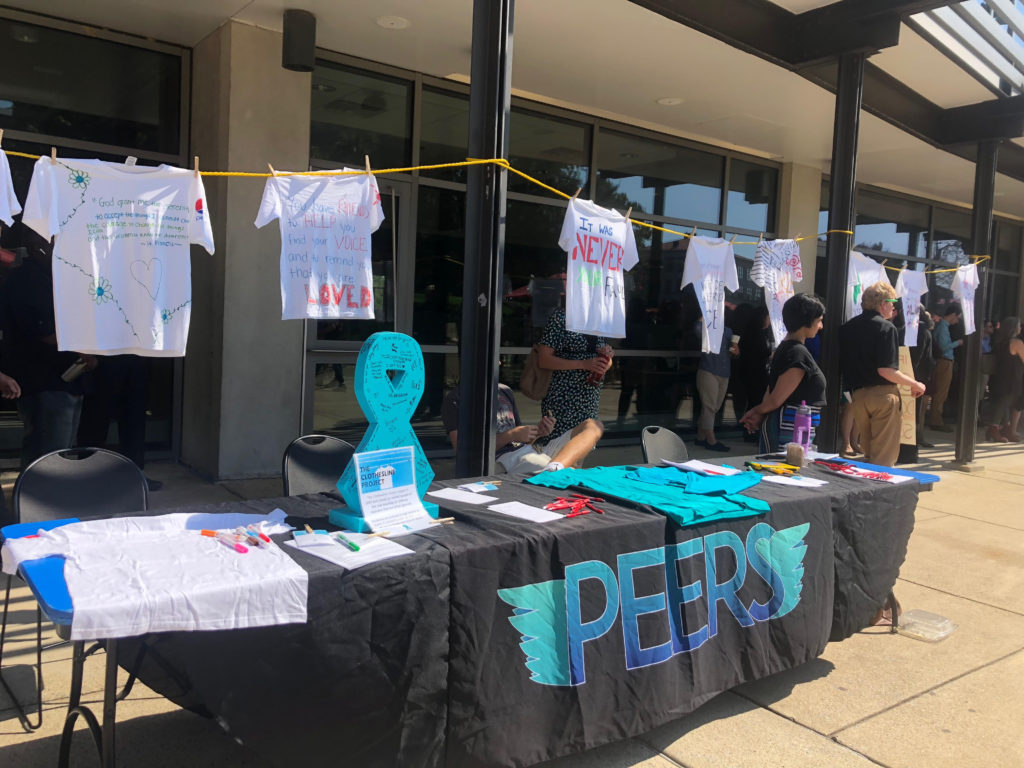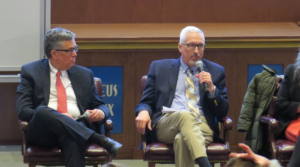PEERS Hosts Clotheslines Project
By Catherine O’Grady
Courtesy of Liz Friden
PEERS, or Peer Educators Empowering Respectful Students, starts the conversation about domestic violence with the Clothesline Project this week on the patio of the Pryzbyla Center.
From 11:00 a.m. to 2:00 p.m. during the first week of October, or Domestic Violence Awareness Month, the PEERS members tabled outside the Pryz, encouraging students to sign blank T-Shirts to show support for the victims of domestic violence. The shirts, reading messages such as “I am a survivor not a victim” and “You are beautiful, you are loved,”are then strung up on a clothesline at the front of the building. New to this year’s project, PEERS also recorded messages from the people who designed the shirts and posted them on social media.
“[PEERS is] a student-led initiative run through the Dean of Students Office that provides the Catholic University community with programs, seminars, workshops and campaigns focused on issues that are commonly faced on college campuses,” said PJ Connolly, this years event coordinator for the Clothesline Project.
PEERS was created in 2006, and was originally called CUAlternative until it was rebranded into PEERS in 2014. With the rebranding came the five focus areas for PEERS: alcohol and drug education, sexual assault and violence education, mental health awareness, bystander intervention, and healthy relationship awareness.
“Issues of sexual violence, dating violence and stalking happen here on campus,” said Stephanie Davey, Assistant Dean of Students and faculty member on PEERS. “One of the reasons PEERS exists on campus is to help students understand what sexual violence is, and to help students develop the skills to be able to intervene as empowered bystanders. The Clothesline Project is one such way that we are able to reach a wider audience, and to boost community participation in advocacy.”
Although, the content of this program may be triggering and is highly controversial, Connolly realizes the necessity to start these conversations.
“In all honesty, any mention of sexual violence has the potential to be triggering to a survivor or a supporter of survivors–but to remain silent about the issue is even more damaging. It requires great responsibility to appropriately hold programs centered around sexual violence, and I believe that the PEERS Team handles this responsibility well. We name the issue, we legitimize the experiences of survivors, we offer resources to those who may need them, and we ensure that nothing is swept under the rug.”
As for the victims of domestic abuse, Catholic University provides a variety of services.
“We have confidential resources like the Counseling Center, priests (like those in Campus Ministry, in their capacity of giving spiritual advice), as well as doctors and nurse practitioners in Student Health Services,” Davey said.
The office of the Dean of Students is also a useful resource that can assist students managing the reality of domestic abuse. They can help students get in contact with the counseling center, get medical attention, provide academic support, offer housing relocation, and even issue an order of no contact. Frank Vinik is the University’s Title IX Coordinator and can help students know their rights under Title IX. Spiritual care is offered for victims of sexual violence in Campus Ministry.
“Catholic University understands the impact that sexual violence can have on our community which is why we offer these supports and resources on our campus,” said Davey.
Connolly stressed the importance of publicly advocating for survivors saying, “To hear one person voice their support is very valuable in its own right, but to see the support of an entire community poured out into the artistic and thought-provoking messages and designs on these t-shirts all collected in one place is, in my opinion, extremely powerful.”







